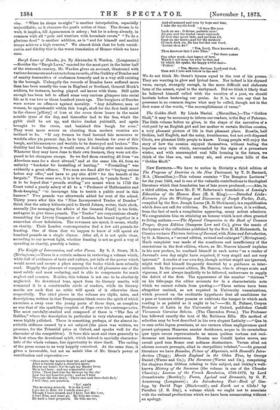Yaw Enrrrons.—We have to notice in Divinity a third edition
of The Progress of Doctrine in the New Testament, by T. D. Bernard, M.A. (Macmillan.)--This volume contains "The Bampton Lectures" for the year 1864, and is one of the valuable contributions to theological literature which that foundation has of late years produced.—.-Also, in a third edition, we have Mr. F. W. Robertson's translation of Le,ssing's Education of the Human Race (H. S. King).—Detached Links : Extracts from she Writings and Discourses of Joseph Parker, D.D., compiled by the Rev. Joseph Lucas (R. D. Dickinson), is a republication which does not call for criticism. Dr. Parker must have, it is evident, from the fact of such a compilation appearing, many ardent admirers. We congratulate him on attaining an honour which is not often granted to living authors.—The Hymnal Companion to the Book of Common Prayer, Organ Edition (Sampson Low and Co.), gives the music of the hymns of the collections published by the Rev. E. H. Bickersteth. In Classics we have Thirteen Satires of Juvenal, with Notes and Introduction, by G. A. Simeox, a" second edition, revised and enlarged" (Rivingtons). Much complaint was made of the scantiness and insufficiency of the annotations in the first edition, where, as Mr. SiIIICOx himself explains in his new preface, he confined himself to such notes "as a reader of JuvenaPs own day might have required, if very stupid and not very ignorant." A reader of our own day, though neither stupid nor ignorant, might well find himself frequently deserted by a guidance so inter- mittent. In the present edition, Mr. Simcox, who is always acute and vigorous, if not always implicitly to be followed, endeavours to supply the defect of the first. The appearance of the number "thirteen on his title-page the editor accounts for in a characteristic note which we cannot refrain from quoting :—" Three satires have been altogether omitted, as not required in University examinations, which proceed on the creditable hypothesis that all candidates for a pass or honours either possess or cultivate the temper to which such reading is as painful as it ought to be."—Mr. E. Palmer, Corpus Professor of Latin in the University of Oxford, publishes Catulli Veronensis Carmine Sdecta. (The Clarendon Press.) The Professor has followed exactly the text of Mr. Robinson Ellis. His method of selection may be best described in his own elegant Latinity :—" Qua in re earn nobis legem posuimus, ut nec cannon ullutm negligeremns quod posset quisquam Musarum amator desiderare, neque in us carminibns qute typis essent repramentanda no unum quidem verbum ant reci- deremus ant immutaremus. Etenim nee Catulli ipsins mores, nee steculi quod turn Ronne erat nolimus dissimulare. Verum aliud set odorem noscere prassepis, snarl in sterquilinio volutari."—In general literature we have Ra,sselas, Prince of Abyssinia, with Boswell's Intro- duction (Tegg); Merrie England in the Olden Time, by George Daniel (Warne and Co.); The Saracens (Warne and Co.), comprising the chapters from Gibbon relating to this subject, and Ockley's well- known History of the Saracens (the volume is one of the Chandos Classics) ; Lessons of the French Revolution, 1789-1872, by Lord Ormathwaite (Bentley); Poems, Lyrical and Dramatic, by G. F. Armstrong (Longmans) ; An Introductory Text - Book of Geo- logy, by David Page (Blackwood); and Earth not a Globe! by Parallax (J. B. Day), a volume which we ought not to associate with the rational productions which we have been enumerating without • an apology.


































 Previous page
Previous page